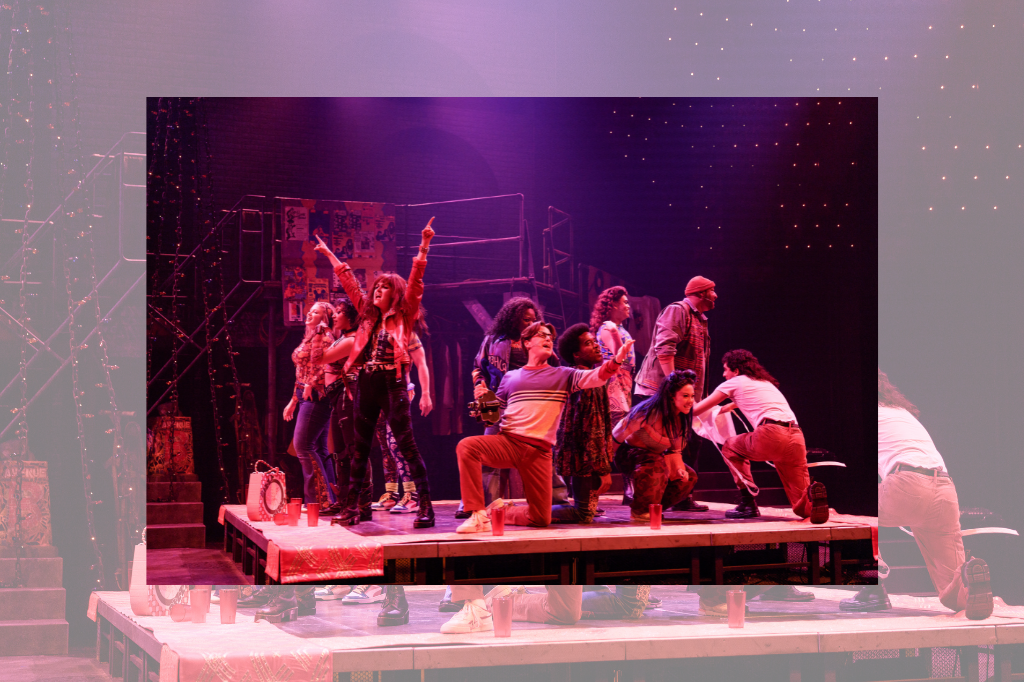REVIEW: Rent at the Stratford Festival
While the Stratford Festival’s production of Rent boasts otherworldly vocal ability and a tender emotional centre, the loose threads of the rock opera’s book by Jonathan Larson waft in the wind, making the musical theatre wunderkind’s untimely death sting even more.
Rent offers a simple story, echoing the opera La Bohème: it’s Christmas Eve in New York City, and the threat of eviction looms over a ragtag group of bohemian artists. Each character nurses a different personal trauma, from HIV/AIDS to homelessness to substance abuse, and as the musical unfurls, those problems intersect, capturing members of the squad in the bloodthirsty web of capitalism.
The hiccups appear gradually: some characters navigate dissatisfying narrative arcs; some lyrics feel on-the-nose beyond recourse; the ending feels in need of an ending.
What hurts is that those are all problems which might have been fixed in the Broadway previews of Rent, the crucial development period for a musical’s creative team to make nips and tucks to a project before it opens to the world. Jonathan Larson didn’t live long enough to see Rent through its development process, nor its meteoric rise to the forefront of theatrical discourse and practice in the ‘90s. As dramatized in his autobiographical rock monologue tick…tick…BOOM!, Larson was a neurotic perfectionist, with a keen sense of what a perfect musical should be.
And while it may be overly romantic to suppose Larson would have fixed the rough spots in his magnum opus had he lived longer, suppose I do. Even all these years later, Rent still feels unfinished.
Which brings us to the Stratford production of Rent.
Director Thom Allison has pieced together an energetic product, sparkling under Michael Walton’s Day-Glo lighting and Ming Wong’s appropriately grimy costumes. Exploding from the smaller-than-it-looks thrust stage of the Festival Theatre, Allison’s Rent at times feels like a three-ring circus, with seductive vignettes and Marc Kimelman’s inventive choreography embedded into every corner of the playing space. There’s a lot to look at, and against Larson’s uniquely lush, difficult score, the production overwhelms the senses.
And to top it all off, those actors are singing their hearts out — perhaps even too much. This is a formidable cast of belters, who frequently show off almost morbidly impressive high notes. Andrea Macasaet, an alum of the Broadway run of Six, plays the down-on-her-luck Mimi, and she frequently treats us to the indelibly warm middle glimmer of her vocal range. The role is a demanding one, and the higher high notes at times felt pinched to me on opening night, but Macasaet simmered into the role as the performance progressed, eventually solidifying herself as a standout, right alongside Lee Siegel, who gives a sublime vocal and emotional performance as Tom Collins. Erica Peck keeps the high-strung Maureen from running away from her, and she too gets to flex a showy, in-control belt, against the gentler, more velvety performance of her on-stage girlfriend, Joanne, played by the lovely Olivia Sinclair-Brisbane. Robert Markus hovers just outside the gang as budding filmmaker Mark, and he nails it, with his clear-as-a-bell voice and mastery of Mark’s loveable geekery, while Kolton Stewat’s Roger is a quieter, more glowering presence, and in fine vocal form during the brooding “One Song Glory.”
And finally, there’s Angel, the HIV-positive drag queen played and sung exquisitely by Nestor Lozano Jr. Theirs is a standout performance of the Stratford Festival’s opening week, bringing the simultaneous sensitivity and sass the role of Angel demands.
Overall, in both the leads and the ensemble, there’s a touch of a yelling problem — it often feels like the cast is fighting to be heard over one another, and over the orchestra, helmed by Franklin Brasz. These seem to be mic level problems which might be ironed out over time, and save some actors’ voices in the process.
For me, this Rent is a fine one, but the divots in Larson’s book require more innovative direction to tie the musical together in a way that feels satisfying. Allison’s direction has pockets of excellence — the presentation of a real AIDS quilt in the show’s final beat is touching and dramaturgically potent — but I craved that innovation elsewhere in the direction. The love for Larson and his work shines through this production, and that’s to be commended; I just missed some of the directorial scrutiny needed to patch the holes in Larson’s unfinished work.
When it premiered in the ‘90s, Rent became a sensation, the poster child for experimentation in American musical theatre. While the Stratford production dutifully honours that original production’s legacy, I’m curious to see how it might settle into itself, and perhaps even expand, as the summer run progresses.
Rent runs at the Stratford Festival through October 28. Tickets are available here.
Intermission reviews are independent and unrelated to Intermission’s partnered content. Learn more about Intermission’s partnership model here.














Comments